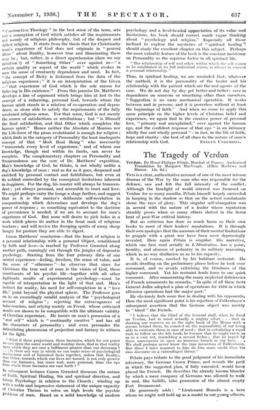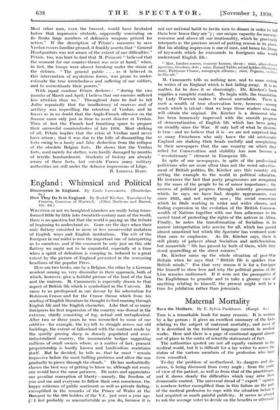The Tragedy of Verdun
Verdun. By Henri Philippe Petain, Marshal of France. Authorized Translation by Margaret MaeVeagh. (Elkin Mathews and
• Marrot. 12s. 6d.) Tins is a clear, authoritative account of one of the most intense
dramas of the War by the man who was responsible for the defence, saw and felt the full intensity of the conflict. Although the limelight of world interest was focussed on Verdun for so many months, Main himself largely succeeded in keeping in the shadow so that on the actual combatants shone the rays of glory. This singular self-abnegation was in accord with the nature of a leader whose reputation steadily grows when so many others shrivel in the fierce heat of post-War critical history.
But no criticism has done so much harm as their own books to most of their leaders' reputations. It is through their own apologies that the measure of their mental limitations to grapple with a great war have been most depressingly revealed. Here again Main is singular. His narrative, which one first read serially in L'Illustration, has a poise, lucidity, and absence of pedantry in its military reasoning, which in no way disillusion us as to his capacity.
It is, of course, marked by his habitual restraint. He avoids dwelling on the preliminary phase before he took over command, and so avoids criticizing the blindness of the higher command. Yet his restraint lends force to one quiet comment. After enumerating the many neglected deficiencies of French armaments he remarks, " In spite of all these facts General Joffre adopted a plan of operations for 1916 in which offensive operations had the major part."
He obviously feels more free in dealing with his opponents. Here the most significant point is his rejection of F'alkenbayn's subsequent assertion that the German object was merely to bleed " the French.
" I believe that the Chief of the General staff, when he fixed on Verdun, had in mind actually a mighty effort . . . that in thawing our reserves on to the right bank of the Meuse with a stream behind them, he counted on the impossibility of our being able to extricate them in ease of need ; that in calculating a rapid rush to follow on the loft bank, he foresaw that he might catch us as in a vast net, resembling a second Sedan ; that he hoped by these manoeuvres to open an immense breach in our lines . • We shall perhaps never know the true intentions of Falkenhayn: But those I have imputed to him do him more credit than his own discourse on a camouflaged theme."
Petain pays tribute to the good judgment of his immediate adversary, the German Crown Prince, and reveals the peril in which the suggested plan, if fully executed, would have placed the French. He describes the already known blundet by which a mere company of Germans was allowed to walk in and, like bailiffs, take possession of the almost empty Fort Douaumont.
He generously adds : " Lieutenant Brandis is a hero whom we might well hold up as a model to our young officers.
Most other men, even the bravest, would have hesitated before that impressive obstacle, supposedly concealing on its flanks large numbers of defensive weapons primed for action." If the description of Petain's measures to save Verdun covers familiar ground, it frankly asserts that " General Headquarters was not aware of the extent of our difficulties." Main, too, was hurt to find that M. Poineare " believed that the moment for our counter-thrust was near at hand," when, in fact, the troops were almost breaking under the strain of the defence. " The general public . . . as it believed in this intervention of mysterious forces, was prone to under- estimate the true wretchedness and suffering of our soldiers, and to overestimate their powers."
With equal candour Main declares : " during the two months of March and April, I believe that our enemies suffered less attrition than we." Throughout June he had to tell Joffre repeatedly that the insufficiency of reserves and of artillery was imperilling the retention of Verdun, and he leaves us in no doubt that the Anglo-French offensive on the Somme came only just in time to avert disaster at Verdun. Then at last the French had breathing space to prepare their successful counterstrokes of late 1916. Most striking of all, Main implies that the crisis at Verdun need never have arisen ; that it was due to the folly of dismantling the forks owing to a hasty and false deduction from the collapse of the obsolete Belgian forts. He shows that the Verdun forts, used merely for shelter, were hardly damaged by months of terrific bombardment. Students of history arc already aware of these facts, but outside France many military authorities are still under the delusive impressions of Liege.
B. LIDDELL HAUT.











































 Previous page
Previous page